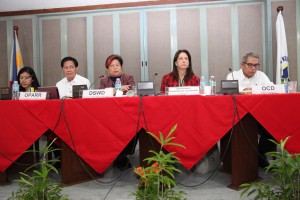
Department of Social Welfare and Development (DSWD) Secretary Corazon Juliano-Soliman announced that the disaster humanitarian response phase in Typhoon Yolanda-affected areas will now transition to recovery and rehabilitation, with the Office of the Presidential Assistant for Rehabilitation and Recovery (OPARR), headed by Secretary Panfilo Lacson, taking the lead.
Sec. Soliman made this announcement during the 6th Inter-Cluster Coordination Meeting of the Philippine Government and the Humanitarian Country Team, which is chaired by DSWD and co-chaired by the United Nations (UN) Resident Coordinator and United Nations Development Program (UNDP) Country Director Luiza Carvalho. It was the last meeting of the Disaster Humanitarian Response Clusters before OPARR takes the helm.
Also present in the meeting were Sec. Lacson, Office of the Civil Defense (OCD) OIC-Director Romeo F. Fajardo, together with representatives from national government agencies, UN agencies, and international non-government organizations.
Long-term interventions
Sec. Soliman stressed that relief and humanitarian phase will now give way to medium and long-term interventions in pursuit of the recovery and rehabilitation phase of the internally displaced population in areas affected by Typhoon Yolanda.
As part of the transition, regular coordination meetings will now be under the leadership of the OPARR.
As his initial interaction with the team, Sec. Lacson emphasized that all initiatives geared towards the rehabilitation of the six regions affected by ‘Yolanda,’ must focus on pre-‘Yolanda’ data to serve as guide in building back better communities.
Carvalho, for her part, expressed UN’s continued support to the Philippine government’s rehabilitation efforts under OPARR.
She vowed that the UN system and other partner-organizations will explore ways on how to support and collaborate with the government under the OPARR structure.
Sec. Soliman thanked the members of the cluster for their extensive and tireless work in disaster response.
“We hope that we shall continue to be partners now that we are focusing on the rehabilitation of ‘Yolanda’ affected areas,” Sec. Soliman said.
Cluster Efforts
During the meeting, Sec. Soliman highlighted the efforts of the various clusters under the Disaster Response Pillar. These include the presentation of the Philippine Approach to Total Sanitation (PhATS) working towards Zero Open Defecation (ZOD) and the ongoing implementation of the Cash for Assets Rebuilding program in Region VIII, which already benefited 181,000 beneficiaries.
The Food Security Cluster distributed seed/seedlings for planting and hand tools.
The Shelter Cluster reported that it will continue to provide shelter support to 81,994 households and will ensure that the 3,000 families still in tents will soon be transferred to safer homes.
The Education and the Health Clusters are focusing on the repair and rehabilitation of education and health facilities.
Sec. Soliman emphasized that although the relief phase is finished, the provision of the needed food support will not cease for those in evacuation centers and those who still need it. ###


